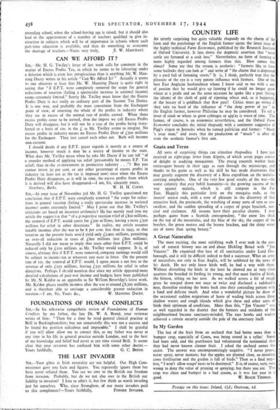COUNTRY LIFE
AN utterly surprising but quite valuable rhapsody on the charm of the farm and the psychology of the English farmer opens the latest issue of the highly technical Farm Economist, published by the Research Institute of Oxford University. It lays down the dogmatic assertion that "most cattle are fattened at a cash loss." Nevertheless no form of farming is more highly regarded among farmers than this. How comes this about? Some say that the reason is aesthetic: "farmers like to have some bullocks they can look at " and write of " the charm that is dispensed by a yard full of fattening steers." It is, I think, perfectly true that the pleasure of the eye is a very potent influence. with farmers. One of the best East Anglican husbandmen whom I know said to me with a sort of passion that he would give up farming if he could no longer grow wheat at a profit and on the same occasion he spoke like a poet (bating the idiom) of the cloth of gokl of ripening wheat and, as it happened, of the beauty of 'a goldfinch that flew past! Critics must go wrong if they take no heed of the influence of " the deep power of joy " in the English farmer, however Philistine he may be considered. To tell a lover of stock or wheat to grow cabbages or apples is waste of time. The farmer, of course, is an economist nevertheless, and the Oxford Farm Economist concludei the initial rhapsody with a sentiment suggestive of Pigg's slogan to Jorrocks when he turned politician and farmer: "Muck 's your man," and avers that the production of "muck " is after all even the aesthetic farmer's first aim.


























 Previous page
Previous page